初中语法一般现在时和现在进行时讲解练习含答案
(完整版)初中语法一般现在时和现在进行时讲解、练习含答案

一般现在时:一、定义与讲解:一般现在时表示经常或习惯性的动作或一般性事实。
,也可表示现在的状态或主语具备的性格和能力。
通常与副词every day(每天),always(总是),usually(通常),often (经常)sometimes(有时),等时间状语连用。
例:(1)表示事物或人物的特征、状态。
The sky is blue.天空是蓝色的。
Mary’s father is an English teacher. 玛丽的爸爸是一名英语老师。
(2)表示经常性或习惯性的动作。
I get up at six every day.我每天六点起床。
She plays sports every day. 她每天都做运动。
(3)表示客观现实。
The table has four legs.桌子有四条腿。
There are 50 students in my class. 我们班有50个学生。
(4)表示客观真理,科学原理,自然现象,等客观事实或格言谚语等。
The sun rises in the east every day.太阳每天从东方升起。
The earth goes around the sun.地球绕着太阳转。
(5)表示平日的喜好。
I like bananas. We don’t like vegetables.He likes ice cream. She doesn’t like strawberries.二.只有主语在第三人称单数时用动词的“三单形式”,其他人称用动词原形。
★动词三单形式的变化规则:1.(1)多数直接在动词词尾加-s.play — plays like — likesask---asks work---works get---gets call---calls(2)以字母s, x, ch, sh或o结尾的动词,在词尾直接加-es.watch---watches wish---wishes do---does go---goes (3)以“辅音字母加 - y”结尾的动词,要先变y为i再加-es.try---tries study---studies cry---cries fly---flies2.不规则变化:be---- is have----has三、一般现在时的句子转换:(1)变一般疑问句:当句子中有be动词或情态动词时,则把be动词或情态动词(can,could等)提到主语的前面,(口诀:一调二变三问号);(2)变否定句:在be动词或情态动词后面直接加not变成否定句. (be后not 莫忘记)例:①陈述句:She is my sister..疑问句→ Is she your sister? Yes, I am./ No, I’m not.否定句→ She is not my sister.②陈述句:I can play soccer.疑问句→ Can you play soccer? Yes,Ican./ No, I can’t.否定句→ I can not /can’t play soccer.★注意:对一般疑问句的回答:一般用什么问就用什么来回答。
初中一般现在时与现在进行时语法详解及习题

初中一般现在时与现在进行时语法详解及习题第一篇:初中一般现在时与现在进行时语法详解及习题一般现在时一、概述一般现在时表示习惯性、经常性、反复性的动作或存在的状态。
“习惯性、经常性、反复性”是一般现在时的三大特性,它不表示特定时间内发生的事。
用法:1)经常性、习惯性的动作或存在的状态。
e.g.I go to school on foot.He is very busy now.2)表示主语的特征、性格、能力、爱好等。
e.g.He can swim.I work hard.I like watching TV.3)表示客观真理e.g.There are seven days in a week.The moon moves round the earth.二、一般现在时的结构时态的结构指的是动词的变化形式。
一般现在时间有两种结构,一种是动词原形,用于主语为非第三人称时的情况;另一种为动词的第三人称单数形式,用于主语为第三人称时的情况。
Eg1.We often get up early in the morning.Eg2.My father often gets up early in the morning.三、谈谈“主语为三单,其后动词s添”在一般现在时中,当主语为第三人称单数时,谓语动词要用第三人称单数形式。
可以简单叙述为“主语为三单,其后动词s添”。
何谓第三人称单数?用一句话概括就是“非你、非我、非复数”,如he, she, it, my father, my mother, my sister, our English teacher, T om, Mike, Liu Jia, China, my book, etc.Eg3.He sometimes goes to school by bike.Eg4.My father works in the hospital as a doctor.四、动词第三人称单数变化规则动词第三人称变化的规则与可数名词复数变化的规则相同。
(完整版)一般现在时和现在进行时练习题(含答案)

3. Listen! The baby
in the next room.
A. crying B. cried C. is crying D. cries
4. Look! The twins
new sweaters.
A. are wearing B. wearing C. are wear D. is wearing
do
match
catch
4.study
fly
cry
play
5. have
五、根据中文意思完成句子
1、学生们在干什么?有一些在打电话,另一些躺在教室里。
the students
? Some
on the phone,
2、“格林先生在看电视吗?” “不, 他在打扫房间。”
in the classroom.
1. My father always
(come) back from work very late.
2. The teacher is busy. He
(sleep) for six hoursa day.
3. Listen! Joan
(sing) in the classroom. She often
music and often
to music.
A. like/ listen B. likes/ listens C. like/are listening
9. She
upatsix in the morning.
A. get B. gets C. getting
10. OnSundays he sometimes
一般现在时和现在进行时练习题(1)含答案

一般现在时和现在进行时练习题(1)含答案一、选择题练习1. Who _____ over there now?A. singingB. are singC. is singingD. Sing2. It’s eight o’clock. The students _____ an English class.A. haveB. havingC. is havingD. are having3. Listen! The baby _____ in the next room.A. cryingB. criedC. is cryingD. cries4. Look! The twins _____ new sweaters.A. are wearingB. wearingC. are wearD. is wearing5. Don’t talk here. Grandparents _____.A.is sleepingB. are sleepingC. sleepingD. sleep6. Tom is a worker. He _____ in a factory. His sisters _____ in a hospital.A. work/ workB. works/ workC. work/ works7. Who _____ English best in your class?A. speakB. speaksC. speaking8. Mrs Read _____ the windows every day.A. is cleaningB. cleanC. cleans9. We _____ music and often _____ to music.A. like/ listenB. likes/ listensC. like/ are listening10. She _____ up at six in the morning.A. getB. getsC. getting11. On Sunday he sometimes _____ his clothes and sometimes _____ some shopping.A. wash/ doB. is washing/ is doingC. washes/ does12. The twins usually _____ milk and bread for breakfast,but Jim _____ some coffee for it.A. have/ haveB. have/ hasC. has/ have二、填空:1. My father always __________(come) back from work very late.2. The teacher is busy. He __________ (sleep) six hours a day.3. Listen! Joan __________(sing) in the classroom.She often __________ (sing) there.4. __________ your brother __________(know) Japanese?5. Where __________ you __________ (have) lunch every day?6. The girl __________(like) wearing a skirt.Look! She __________(wear) a red skirt today.三、写出下列动词的现在分词形式1. work___________ sing__________ play__________ study_________2. dance________ have__________ write__________ take__________3. run__________ sit__________ shop__________ swim__________四、写出下列动词的第三人称单数形式1. work__________ read__________ clean__________ write__________2. teach_________ wash__________ guess__________ watch__________3. go__________ do___________ photo__________4. study__________ fly__________ cry__________ play__________5. have__________ be_________五、根据中文意思完成句子1、学生们在干什么?有一些在打电话,另一些躺在沙滩上。
人教版初一英语一般现在时与现在进行时区别练习题40题含答案解析

人教版初一英语一般现在时与现在进行时区别练习题40题含答案解析1. Look! Tom ______ (play) football on the playground.A. playsB. is playingC. playD. are playing答案解析:B。
本题考查现在进行时。
句中的“Look!”表示看的动作正在进行,是现在进行时的标志词。
现在进行时的结构是be动词(am/is/are)+动词的现在分词形式。
主语Tom是第三人称单数,be 动词用is,play的现在分词是playing,所以选B。
A选项“plays”是一般现在时的第三人称单数形式,不符合语境。
C选项“play”是一般现在时的原形,这里需要用进行时态,所以错误。
D选项“are playing”中are用于第二人称或复数主语,与Tom(第三人称单数)不匹配。
2. My sister ______ English every day.A. studyB. is studyingC. studiesD. are studying答案解析:C。
这题考查一般现在时。
“every day”表示每天,是一般现在时的时间标志。
主语“My sister”是第三人称单数,一般现在时中,第三人称单数作主语时,动词要用第三人称单数形式,study的第三人称单数形式是studies,所以选C。
A选项“study”是原形,用于第一、二人称或复数主语,不符合本题要求。
B选项“is studying”是现在进行时,与“every day”所表示的一般现在时的时间不符。
D选项“are studying”中are用于第二人称或复数主语,而本题主语是第三人称单数,所以错误。
3. Listen! The students ______ in the classroom.A. singB. are singingC. singsD. is singing答案解析:B。
一般现在时与现在进行时练习题及答案
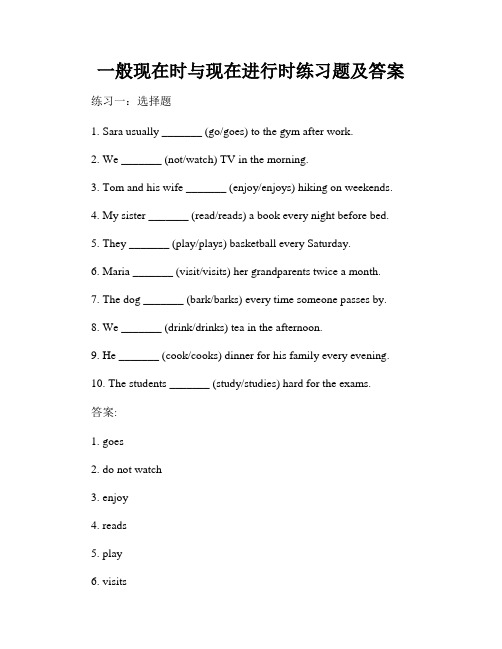
一般现在时与现在进行时练习题及答案练习一:选择题1. Sara usually _______ (go/goes) to the gym after work.2. We _______ (not/watch) TV in the morning.3. Tom and his wife _______ (enjoy/enjoys) hiking on weekends.4. My sister _______ (read/reads) a book every night before bed.5. They _______ (play/plays) basketball every Saturday.6. Maria _______ (visit/visits) her grandparents twice a month.7. The dog _______ (bark/barks) every time someone passes by.8. We _______ (drink/drinks) tea in the afternoon.9. He _______ (cook/cooks) dinner for his family every evening.10. The students _______ (study/studies) hard for the exams.答案:1. goes2. do not watch3. enjoy4. reads5. play6. visits7. barks8. drink9. cooks10. study练习二:用适当的动词形式填空1. I usually _______ (read) a book before bed.2. Look! The sun _______ (shine) brightly in the sky.3. My parents _______ (watch) TV every evening.4. They _______ (not go) to the park on Sundays.5. Sara _______ (drink) a cup of coffee every morning.6. The bus _______ (arrive) at 8 o'clock every day.7. We _______ (play) soccer on Saturdays.8. Jenny _______ (not eat) meat. She's a vegetarian.9. The children _______ (love) to play in the playground.10. Tom _______ (always be) late for school.答案:1. read2. is shining3. watch4. do not go5. drinks6. arrives7. play8. does not eat9. love10. is always。
(word完整版)初中英语时态讲解及练习(含答案),推荐文档

时态1. 一般现在时●形式:do does(单数第三人称)●意义:一般现在时表示客观的、普遍性的真理以及经常性的事件。
●用法:A) 表示现在发生的动作、情况、状态和特征。
B) 经常性、习惯性动作。
e.g.:He always helps others. (他总是帮助别人。
)He often goes to the gym.C) 客观事实和普遍真理。
尤其要注意,如果前后文不是一般现在时,则无法保持主句、从句时态一致。
e.g.: The sun rises in the east and sets in the west.Knowledge is power.●这一用法场合一些表动作频率的时间副词连用:1). 表示肯定的频率副词:always, frequently, usually, sometimes, generally, occasionally, often etc.2). 表示否定的频率副词:never, seldom, rarely etc.➢这些副词的位置:在Be动词后,实义动词前。
e.g. He is always late.2. 一般过去时●形式:did●意义:一般过去时表示在过去的某一特定时间发生和结束的活动或情况。
●用法:A) 表示过去某个时间发生的动作或情况。
e.g.: I saw him in the library yesterday morning. (有特定的时间状语)➢yesterday, yesterday evening, last night/month/spring/year, the night before last(前天晚上),three days/months/years ago, in 1999 etc.。
这些时间状语之前不用加介词。
B) 表示过去习惯性动作,一直持续或反复发生的动作,此时可与表示拼读的时间副词连用。
e.g.: I slept for eight hours last night. (表示在过去某一段时间内持续的动作,但这动作现在已经结束了)3. 一般将来时●形式:will/shall do或be going to do●意义:一般将来时表示在未来的某个时间将要发生的某个动作或状态。
初中一般现在时与现在进行时语法详解及习题
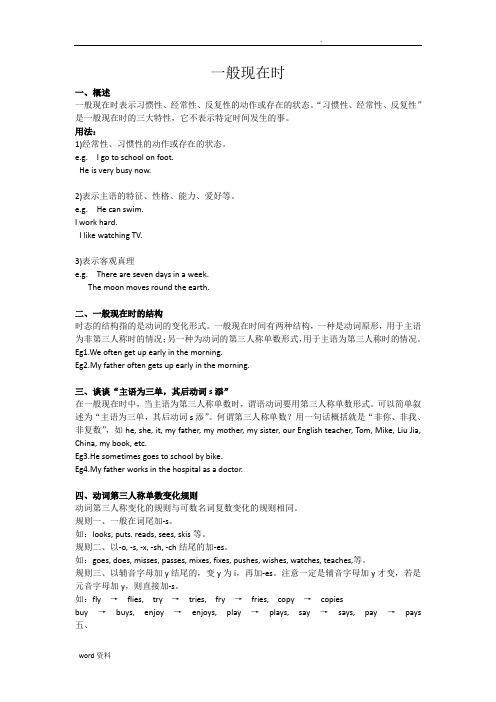
一般现在时一、概述一般现在时表示习惯性、经常性、反复性的动作或存在的状态。
“习惯性、经常性、反复性”是一般现在时的三大特性,它不表示特定时间发生的事。
用法:1)经常性、习惯性的动作或存在的状态。
e.g. I go to school on foot.He is very busy now.2)表示主语的特征、性格、能力、爱好等。
e.g. He can swim.I work hard.I like watching TV.3)表示客观真理e.g. There are seven days in a week.The moon moves round the earth.二、一般现在时的结构时态的结构指的是动词的变化形式。
一般现在时间有两种结构,一种是动词原形,用于主语为非第三人称时的情况;另一种为动词的第三人称单数形式,用于主语为第三人称时的情况。
Eg1.We often get up early in the morning.Eg2.My father often gets up early in the morning.三、谈谈“主语为三单,其后动词s添”在一般现在时中,当主语为第三人称单数时,谓语动词要用第三人称单数形式。
可以简单叙述为“主语为三单,其后动词s添”。
何谓第三人称单数?用一句话概括就是“非你、非我、非复数”,如he, she, it, my father, my mother, my sister, our English teacher, Tom, Mike, Liu Jia, China, my book, etc.Eg3.He sometimes goes to school by bike.Eg4.My father works in the hospital as a doctor.四、动词第三人称单数变化规则动词第三人称变化的规则与可数名词复数变化的规则相同。
规则一、一般在词尾加-s。
现在进行时和动词一般现在时解析对比以及练习2023-2024学年七年级上册英语

现在进行时&一般现在时(知识对比讲解)一、定义对比现在进行时:★表示现在或现阶段正在进行/发生的动作或存在的状态例:I am doing homework.He is running.一般现在时:★表示经常性/习惯性/规律性/真理性的动作或存在的状态例:I usually go to school by bike.I am a teacher.二、标志词对比现在进行时的标志词:◆now◆right now◆look◆listen◆at this/the moment一般现在时的标志词:◆often/usually/always/sometimes等频率副词◆every day/night/morning等三、相关动词形式的变化规则现在进行时中,现在分词(动词加ing)的变化规则◆一般情况下,直接加ing如:sleep → sleeping look → looking◆以不发音的字母e结尾,去e,加ing如: e → ing have → having◆以重读闭音节结尾,双写尾字母,加ing如:put → putting swim → swimming runrunning shopshopping ◆特殊变化:lielying diedying一般现在时中,行为动词变三单的变化规则◆一般情况下,加s如:look → looks want → wants◆以s、x、o、ch、sh结尾,加es如:go→ goes watch → watches◆以辅音字母+y结尾,变y为i,再加es如:fly → flies study → studies◆特殊变化如:have → has四、句型结构对比现在进行时的句型结构:1> 肯定句:主语+be +动词ing +其他.如:They are running now.2> 否定句:主语+ be+not +动词ing +其他.如:They are not running now.=They aren't running now.3> 一般疑问句:Be + 主语+动词ing +其他?如:Are they running now?4> 特殊疑问句:特殊疑问词+ be +主语+动词ing +其他?如: What are they doing now?一般现在时的句型结构:第一种:含be型1> 肯定句:主语+be +其他.如:She is in the room.2> 否定句:主语+ be+not +其他.如:She is not in the room.=She isn't in the room.3> 一般疑问句:Be + 主语+其他?如:Is she in the room?4> 特殊疑问句:特殊疑问词+ be +主语+其他?如: Where is she?第二种:含实义动词型1> 肯定句:主语+动词+其他.如:I like reading.(主语I不符合三单,动词like用原形)She likes reading.(主语She符合三单,动词like变三单)即:● 肯定句中,主语三单,动词变三单。
初中英语一般现在时与现在进行时对比完形填空题30题答案解析版

初中英语一般现在时与现在进行时对比完形填空题30题答案解析版1My name is Lily. I am a middle school student. I usually get up at seven o'clock in the morning. Then I brush my teeth and wash my face. After that, I have breakfast. I often eat bread and drink milk. I go to school by bike. At school, I have many classes. I like English very much. Sometimes I read English books in the library. Now, I am sitting in the classroom and listening to the teacher.1. I usually ___ up at seven o'clock in the morning.A. getB. getsC. am gettingD. got答案:A。
一般现在时中,主语是I,谓语动词用原形。
B 选项是第三人称单数形式;C 选项是现在进行时;D 选项是一般过去时。
2. I often eat bread and drink milk. This is a description of ___.A. present continuous tenseB. past continuous tenseC. simple present tenseD. future tense答案:C。
“I often eat bread and drink milk.”是一般现在时的描述。
A 选项是现在进行时;B 选项是过去进行时;D 选项是将来时。
九年级英语时态复习练习题及答案
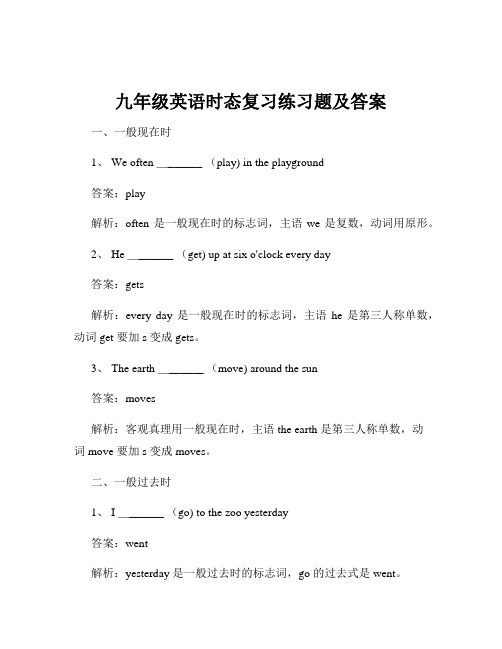
九年级英语时态复习练习题及答案一、一般现在时1、 We often _______ (play) in the playground答案:play解析:often 是一般现在时的标志词,主语 we 是复数,动词用原形。
2、 He _______ (get) up at six o'clock every day答案:gets解析:every day 是一般现在时的标志词,主语he 是第三人称单数,动词 get 要加 s 变成 gets。
3、 The earth _______ (move) around the sun答案:moves解析:客观真理用一般现在时,主语 the earth 是第三人称单数,动词 move 要加 s 变成 moves。
二、一般过去时1、 I _______ (go) to the zoo yesterday答案:went解析:yesterday 是一般过去时的标志词,go 的过去式是 went。
2、 She _______ (be) happy last week答案:was解析:last week 是一般过去时的标志词,主语 she 是第三人称单数,be 动词用 was。
3、 They _______ (not do) their homework last night答案:didn't do解析:last night 是一般过去时的标志词,否定句要用助动词didn't,后面接动词原形 do。
三、一般将来时1、 We _______ (have) a party next week答案:will have / are going to have解析:next week 是一般将来时的标志词,可以用 will +动词原形或者 be going to +动词原形的结构。
2、 He _______ (come) back tomorrow答案:will come / is going to come解析:tomorrow 是一般将来时的标志词,同理可用 will +动词原形或者 be going to +动词原形。
初中英语八大时态全套精讲及练习题(附答案)
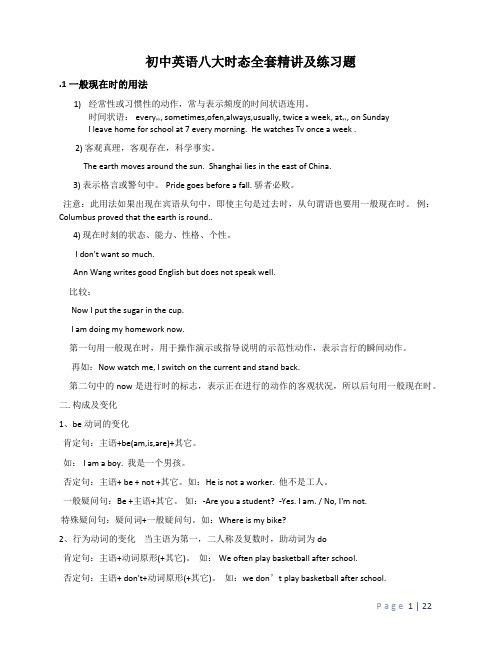
初中英语八大时态全套精讲及练习题.1 一般现在时的用法1)经常性或习惯性的动作,常与表示频度的时间状语连用。
时间状语: every…, sometimes,ofen,always,usually, twice a week, at…, on SundayI leave home for school at 7 every morning. He watches Tv once a week .2) 客观真理,客观存在,科学事实。
The earth moves around the sun. Shanghai lies in the east of China.3) 表示格言或警句中。
Pride goes before a fall. 骄者必败。
注意:此用法如果出现在宾语从句中,即使主句是过去时,从句谓语也要用一般现在时。
例:Columbus proved that the earth is round..4) 现在时刻的状态、能力、性格、个性。
I don't want so much.Ann Wang writes good English but does not speak well.比较:Now I put the sugar in the cup.I am doing my homework now.第一句用一般现在时,用于操作演示或指导说明的示范性动作,表示言行的瞬间动作。
再如:Now watch me, I switch on the current and stand back.第二句中的now是进行时的标志,表示正在进行的动作的客观状况,所以后句用一般现在时。
二. 构成及变化1、be动词的变化肯定句:主语+be(am,is,are)+其它。
如: I am a boy. 我是一个男孩。
否定句:主语+ be + not +其它。
如:He is not a worker. 他不是工人。
完整版初中一般现在时和现在进行时讲解练习及答案

一般现在时和现在进行时一般现在时用法:1.现阶段经常性习惯性动作或存在的状态I leave home for school at 7 every morning.2.客观真理,客观存在,科学事实The earth moves around the sun.Shanghai lies in the east of China・3.在格言或警句中Pride goes before a fall.骄者必败。
常用时间状语:sometimes, often, every day, usually, always 等构成:1 •动词用原形Ilikeit.2.当主语是第三人称单数时,动词要加・s(・es) She likes it.3.be 动词用am, is, areI am a teacher・He is a boy. They are girls・否定形式:l.don '动t+词原形I don ' t like it. They don t like it.2•当主语是第三人称单数时,则为doesn'动t+词原形He doesn ' t like it.一般疑问句:把do或does放在主语的前面,后面动词用原形Do you like it? Does Ann like it?注意:动词三单的变化规则【巩固练习】写出下列动词的第三人称单数drink ________ stay __________ l ook __________ have ________ do __________ pass _______ caixy _________ come _________ watch ______ brush _________1._____________ M i*s・ Smith the windows every day.A.is cleaningB. cleanC. cleans2.0n Sunday he sometimes ________ h is clothes and sometimes ________ some shopping・A. wash/ do B・ is washing/ is doing C・ washes/ does3.She ______ up at six in the morning・ A. get B. gets C. getting现在进行时1 •定:表示正在生或行的作构:be (am, is, are)+ 在分形式(写:be+ -ing)A、述句(肯定句)主 + be(am, is, a re)+ 在分,女D :I am reading English.我正在英。
初中语法一般现在时,一般过去时,现在进行时(附答案).docx

一般现在时(1)表示经常或习惯性的动作。
⑵常与频率副词:never从来不seldom极少sometimes有时often经常usually 常常always 总是或every day 每天、in the morning / afternoon / evening 在早上/下午/晚上等连用。
(3)结构:①be型主语+be动词+其他。
表示主语的个性、特征或状态。
a.肯定句中,只出现be,如:I am a student.我是一名学生。
b・否定句中,要在be后面加not,如:She isn't a teacher.她不是教师。
c.一般疑问句,要将be放在句子开头(注意句首字母大写),句尾用问号,答语用Yes,主语+be.或No,主语+be+not.如:一Are you ready?一你准备好了吗?一Yes, I am.一是的,我准备好了。
(一No, Pm not.一不,我没准备好。
)②实义动词型主语+动词原形/动词第三人称单数s/es+其他。
表示经常性或习惯性的动作。
a.肯定句中,只出现实义动词,女口:I get up in the morning.我早晨起床。
b.否定句屮,在实义动词前而加do(does)+not, do(does)作助动词,本身无意义, 常与not 缩写成don'tCdoesn't),如:I don't like vegetables.我不喜欢蔬菜。
c.一般疑问句,要在句子开头加助动词Do(does),句尾用问号,简略答语用Yes,主语+do(does).或No,主语+do(does)+not.女口:一Do you like oranges?一你喜欢桔了吗?—Yes, Ido.—是的,我喜欢。
(—No, I don't.—不,我不喜欢。
(5) 一般现在时用行为动词的原形,但第三人称单数作主语时,动词耍用第三人称单数形式。
三单变化:①多数在动词后+s play 一plays like 一likesask■一asks work■一works get■一gets stay—stays②以字母s, x, ch, sh或o结尾的动词,在词尾直接加-es. watch-一watcheswish―wishes fix■一fixes do-一does go-一goes pass―passes③以“辅咅字母加・y”结尾的动词,要先变y为i再加-es. try—tries study■一studies cry—cries fly■一flies④不规则变化:be——is are have——has练习1.We often _____ (play) in the playground.2.He _____ (get) up at six o'clock.3. ____ you ______ (brush) your teeth every morning.4.What (do) ______ he usually (do) ______ after school?5.Danny _____ (study) English, Chinese, Maths, Science and Art at school.6.Mike sometimes ________ (go) to the park with his siste匚7.At eight at night, she __________ (watch) TV with his parents.8. _______ Mike ________ (read) English every day?9.How many lessons _________ your classmate ________ (have) on Monday?10.What time ________ his mother _________ (do) the housework?I.Do you often play football after school?(肯定回答)2.1have many books.(改为否定句)3.Gao Shan's sister likes playing table tennis (改为否定句)4.She lives in a small town near New York.(改为一般疑问彳U)5.1watch TV every day.(改为一般疑问句)6.David has got a goal.(改为一般疑问句)7.We have four lessons.(否定句)& Nancy doesn't run fast (肯定句)9.My dog runs fast.否定句:一般疑问句:10.Mike has two letters for him. 一般疑问句:否定句:II. 1 usually play football on Friday afternoon.否定句:一般疑问句:划线提问12.Su Yang usually washes some clothes on Saturday.否定句:一般疑问句:划线捉问:13.Mingming usually waters the flowers every day 否定句:般疑问句:划线提问14.Tom does his homework at home.否定句:一般疑问句:划线提问一般过去时(1)一般过去时表示在过去某个时间发生的动作或存在的状态.(2)常'和yesterday, last night/year, two days/weeks ago, just now. a moment ago, in 1990/2006等表示过去的时间状语连用。
初中英语时态练习题及答案

初中英语时态练习题及答案1. (一般现在时) I ___ (go) to school at 7:00 every morning.答案: go2. (一般过去时) She ___ (visit) her grandparents last weekend.答案: visited3. (一般将来时) We ___ (have) a birthday party next Sunday.答案: will have4. (现在进行时) Look! The children ___ (play) in the park.答案: are playing5. (过去进行时) What ___ (do) you ___ (do) at this time yesterday?答案: were, doing6. (将来进行时) By this time tomorrow, I ___ (be) ___ (study) for my math test.答案: will be, studying7. (现在完成时) They ___ (already/finish) their homework.答案: have already finished8. (过去完成时) When I got to the cinema, the movie ___ (already/start).答案: had already started9. (将来完成时) By the end of this year, he ___ (travel) to10 different countries.答案: will have traveled10. (现在完成进行时) She ___ (teach) English for five years.答案: has been teaching答案解析1. 一般现在时表示习惯性的动作或状态,用动词原形或第三人称单数形式。
(完整版)一般现在时和现在进行时练习题(含答案),文档
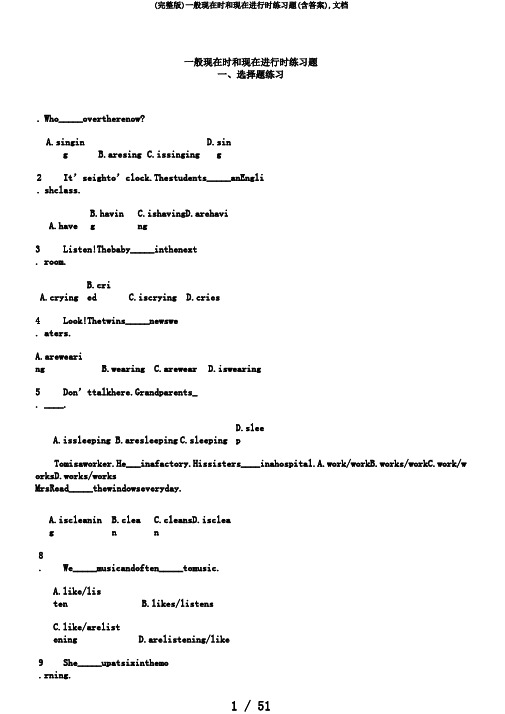
一般现在时和现在进行时练习题一、选择题练习.Who_____overtherenow?A.singing B.aresing C.issinging D.sing2 .It’seighto’clock.Thestudents_____anEngli shclass.A.haveB.havingC.ishavingD.arehaving3 .Listen!Thebaby_____inthenext room.A.cryingB.cried C.iscrying D.cries4 .Look!Thetwins_____newswe aters.A.arewearing B.wearing C.arewear D.iswearing5 .Don’ttalkhere.Grandparents_____.A.issleepingB.aresleepingC.sleepingD.sleepTomisaworker.He___inafactory.Hissisters____inahospital.A.work/workB.works/workC.work/worksD.works/worksMrsRead_____thewindowseveryday.A.iscleanin gB.cleanC.cleansD.isclean8.We_____musicandoften_____tomusic.A.like/listen B.likes/listensC.like/arelistening D.arelistening/like9 .She_____upatsixinthemo rning.A.getB.getsC.gettingD.isgetting10.OnSundayhesometimes_____hisclothesandsometimes_____someshopping.A.wash/doB.iswashing/isdoingC.washes/doesD.wash/does11.Thetwinsusually_____milkandbreadforbreakfast,butJim_____somecoffeeforit.A.have/haveB.have/hasC.has/haveD.have/haves二、填空:Myfatheralways__________(come)backfromworkverylate.Theteacherisbusy.He__________(sleep)forsixhoursaday.3.Listen!Joan__________(sing)intheclassroom.Sheoften__________ (sing)there. __________yourbrother__________(know)Japanese?Where__________you__________(have)luncheveryday?girl__________(like)wearingaskirt.Look!She__________(wear)aredskirttoday._____(speak)Englishbestinyourclass?三、写出以下动词的现在分词形式1.work_______sing______lay______2.dance______have____write______3.run________sit_______shop____ __study_____ take______ swim_______4.lie_______四、写出以下动词的第三人称单数形式_read_________clean_______write___________2.teach______wash_______guess______ watch__________3.go_______ do_________match________catch__________4.study_____ fly________ cry________ play_________5.have______一般现在时和现在进行时复习材料答案一、选择题练习1 .Who_____overtherenow?A.singingB.aresingC.issinging D.sing2 .It’seighto’clock.Thestudents_____anEng lishclass.A.haveB.having C.ishavingD.arehaving3 .Listen!Thebaby_____inthe nextroom.A.cryingB.criedC.iscrying D.cries4 .Look!Thetwins_____newswe aters.A.arewear ingB.wearingC.arewear D.iswearing5 .Don’ttalk here.Grandpare nts_____.A.issleep ingB.aresleepingC.sleeping D.sleep6 .Tomisaworker.He_____inafactory.Hissisters _____inahospital.A.work/work B.works/work C.work/works7 .MrsRead_____thewindowsev eryday.A.iscleaning B.clean C.cleans8 .We_____musicandoften_____tomusic.A.like/listenB.likes/listens C.like/arelistening9 .She_____upatsixinth emorning.A.getB.getsC.getting10 .OnSundayshesometimes_____hisclothesandsometimes____ _someshopping.A.wash/doB.iswashing/isdoing C.washes/does11 .Thetwinsusually_____milkandbreadforbreakfast,butJim _____somecoffeeforit.A.have/haveB.have/hasC.has/have二、填空:Myfatheralways__come____(come)backfromworkverylate.Theteacherisbusy.He__sleeps___(sleep)sixhoursaday.Listen!Joan__issinging__(sing)intheclassroom.Sheoften__sings__(sing)there._Does__yourbrother___know___(know)Japanese?Where__do___you____have___(have)luncheveryday?Thegirl___likes____(like)wearingaskirt.Look!She___iswearing___(wear)aredskirttoday.___spea ks__(speak)Englishbestinyourclass?三、写出以下动词的现在分词形式1.work__working ____sing__singing____play__playing____study___studying_______2.dance_dancing ___have__having___write__writing_____take___taking____3.run__running_ ___sit__sitting_____shop__shopping___swim__swimming_____4.lie___lying_____四、写出以下动词的第三人称单数形式1.work_works___ _read___reads____clean___cleans_____write__writes________2.teach__teaches__wash__washes__guess___guesses____watch____watches______3.go___goes____ ___do____does_______(photo___photos_______)4.study__studie s___fly___flies_____cry___cries_______play___plays_______5.have___has___ ____。
- 1、下载文档前请自行甄别文档内容的完整性,平台不提供额外的编辑、内容补充、找答案等附加服务。
- 2、"仅部分预览"的文档,不可在线预览部分如存在完整性等问题,可反馈申请退款(可完整预览的文档不适用该条件!)。
- 3、如文档侵犯您的权益,请联系客服反馈,我们会尽快为您处理(人工客服工作时间:9:00-18:30)。
一般现在时:一、定义与讲解:一般现在时表示经常或习惯性的动作或一般性事实。
,也可表示现在的状态或主语具备的性格和能力。
通常与副词everyday(每天),always(总是),usually(通常),often(经常)sometimes(有时),等时间状语连用。
例:(1)表示事物或人物的特征、状态。
Theskyisblue.天空是蓝色的。
Mary’sfatherisanEnglishteacher.玛丽的爸爸是一名英语老师。
(2)表示经常性或习惯性的动作。
Igetupatsixeveryday.我每天六点起床。
Sheplayssportseveryday.她每天都做运动。
(3)表示客观现实。
Thetablehasfourlegs.桌子有四条腿。
Thereare50studentsinmyclass.我们班有50个学生。
(4)表示客观真理,科学原理,自然现象,等客观事实或格言谚语等。
Thesunrisesintheeasteveryday.太阳每天从东方升起。
Theearthgoesaroundthesun.地球绕着太阳转。
(5)表示平日的喜好。
’tlikevegetables.’tlikestrawberries.二.只有主语在第三人称单数时用动词的“三单形式”,其他人称用动词原形。
★动词三单形式的变化规则:1.(1)多数直接在动词词尾加-s.play—playslike—likesask---askswork---worksget---getscall---calls(2)以字母s,x,ch,sh或o结尾的动词,在词尾直接加-es.watch---watcheswish---wishesdo---doesgo---goes(3)以“辅音字母加-y”结尾的动词,要先变y为i再加-es.try---triesstudy---studiescry---criesfly---flies2.不规则变化:be----ishave----has三、一般现在时的句子转换:(1)变一般疑问句:当句子中有be动词或情态动词时,则把be动词或情态动词(can,could等)提到主语的前面,(口诀:一调二变三问号);(2)变否定句:在be动词或情态动词后面直接加not变成否定句.(be后not莫忘记) 例:①陈述句:Sheismysister..疑问句→IssheyoursisterYes,Iam./No,I’mnot.否定句→Sheisnotmysister.②陈述句:Icanplaysoccer.疑问句→CanyouplaysoccerYes,Ican./No,Ican’t.否定句→Icannot/can’tplaysoccer.★注意:对一般疑问句的回答:一般用什么问就用什么来回答。
但以下例外:IsthisapencilYes,itis./No,itisn’t.IsthatyourbackpackYes,itis./No,itisn’t.AretheseyourparentsYes,they’re./No,theyaren’t.ArethoseJim’sbrothersYes,they’re./No,theyaren’t.(3)当句子中没有be动词,也没有情态动词时,变一般疑问句时,在主语前加助动词do(I,we,you,以及复数),does(第三人称单数she,he,it等)变成问句;(4)变否定句时,在主语后谓语动词前加助动词don’t,doesn’t变成否定句,切记:助动词后的动词则还原成动词原形。
例:①陈述句:Wegetup(起床)at7:00everymorning.疑问句→Doyougetupat7:00everymorning否定句→Wedon’tgetupat7:00everymorning.②陈述句:Shehasabrother.疑问句→Doesshehaveabrother否定句→Shedoesn’thaveabrother.※在一般现在时中,当主语是第三人称单数时,谓语动词要用第三人称单数形式,即常在动词原形后加-s或-es。
但有些同学们对于哪些主语是第三人称单数还不十分清楚,现归纳总结如下:一、人称代词he,she,it是第三人称单数。
如:HelikeswatchingTV.他喜欢看电视。
Shehaslunchattwelve.她十二点吃午餐。
二、单个人名、地名或称呼作主语;是第三人称单数。
如:①HanMeilikessalsd.韩梅喜欢萨拉。
②BeijingisinChina.北京在中国。
③UncleWangoftenplaysvolleyball..王叔叔经常打排球。
三、单数可数名词或"this/that/the+单数可数名词"作主语时,是第三人称单数。
如:②Thisbookisyours.这本书是你的。
③Thatcarisred.④ThecatisLucy's.这只猫是露茜的。
四、不定代词someone,somebody,nobody,everything,something等及指示代词this,that作主语时,是第三人称单数。
①Everyoneishere.大家到齐了。
②Thereisawatchonthetable.桌上有块手表。
③Thisisapen.这是一支钢笔。
④Thatisaneraser.五、不可数名词作主语时为第三人称单数。
如:①Themilk(牛奶)isintheglass.牛奶在玻璃杯里。
②Thebreadisverysmall.那面包很小。
六、当数字或字母作主语时,看作第三人称单数。
如:①"6"isaluckynumber."6"是个吉利数字。
②"I"isaletter."I"是个字母。
一、按照要求改写句子1.Thisismypencil(变一般疑问句)yourpencil’s.(变一般疑问句)socksKate’s.(变肯定句)somebooks..(变为否定句).(用she改写句子)’s anEnglishdictionary.(对画线部分提问)..(变一般疑问句)二、用Be动词填空。
,not.3....三.用所给动词的适当形式填空。
(like)’s(play)tennis!(like)English.(meet)you!(need)somefruits.一般现在时用法专练:一、写出下列动词的第三人称单数形式。
havelikedrink_____go_____stay____study____teach_____make______look______have____come_____watch______plant_____fly_____do_____ 二、用括号内动词的适当形式填空。
(have)dinnerathome.(be)inClassOne.(notwatch)TVonMonday.(notgo)tothezooonSunday.(like)pears(have)eggseveryday(be)somewaterinthebottle.(like)cooking.(have)thesamehobby.(do)notlikePE.(watch)TVintheevening.五、改错(划出错误的地方,将正确的写在横线上)一般现在时态句型转换1.Thisisawhitekey.(对画线部分进行提问)2.Ben’sbagis yellowandred.(对画线部分进行提问)3.HernameisGina.(对画线部分进行提问)4.Myphonenumberis673-8220.(对画线部分进行提问)5.Theboy’snameis Jack.(对画线部分进行提问)6.Thepictureisonthewall.(对画线部分进行提问)7.Yourbaseballisunderthechair.(对画线部分进行提问)8.Hisbookisonthedesk.(对画线部分进行提问)9.Someballsareinthedresser.(对画线部分进行提问)10.Mycomputerisonmydesk.(对画线部分进行提问)11.HeisJohnny.(改为一般疑问句)12.Thesearehisparents.(改为一般疑问句)13.Thisismysister.(改为一般疑问句).(改为一般疑问句).(改为一般疑问句).(改为一般疑问句).(改为一般疑问句).(改为一般疑问句).(改为一般疑问句).(改为一般疑问句).(改为否定句).(改为否定句).(改为否定句).(改为否定句).(改为否定句).(改为否定句).(改为否定句).(改为否定句)!(写出答语)35.Isthatadictionary(改为复数句)____________________________________________36Thesearephotos.(改为单数句)(作肯定回答)(作否定回答)(作否定回答).(改为单数句)(作肯定回答)(作否定回答)(改为复数句子).(改为单数句子)现在进行时现在进行时是由“助动词be(am,is,are)+动词-ing”构成,表示说话者“此刻”或现阶段的行为。
二、现在进行时的基本结构1.肯定句:主语+be(am,is,are)+现在分词+……例如:Iamspeakingwithhimonthephone.我正和他通电话。
Heisplayingtennis.他正在打网球。
Myparentsaredancing.我父母正在跳舞。
2.否定句:主语+benot+现在分词+……例如:I'mnotstudying.我没在学习。
Sheisnotreadingnow.现在她不是在看书。
Theyarenotwriting.他们没在写。
3.一般疑问句:Be动词+主语+现在分词+……例如:(1)—IsshestillhelpingLiLing她还在帮助李玲吗—Yes,sheis.是的。
/No,sheisn't.不,她没在帮李玲。
(2)—Areyoulisteningtomusic你正在听音乐吗—Yes,Iam.是的。
/No,I'mnot.不,我没有听音乐。
4.特殊疑问句:特殊疑问词+be动词+主语+现在分词+……例如:—Whatareyoustudying你正在学什么—I'mstudyingEnglish.我在学英语。
—WhatisMikedoing迈克在做什么----Heiswatchingthefootballmatch.三、现在分词的变化规则1.一般在动词末尾加ing,如:think-thinking go-going2.以不发音字母e结尾的动词,先去掉e,再加ing,如:come-coming make-making3.以重读闭音节结尾的动词,中间只有一个元音字母,词尾只有一个辅音字母,应双写末尾的辅音字母,再加ing,如:put-putting run-running四、现在进行时的基本用法1.表示此时此刻(说话者)正在进行的动作。
